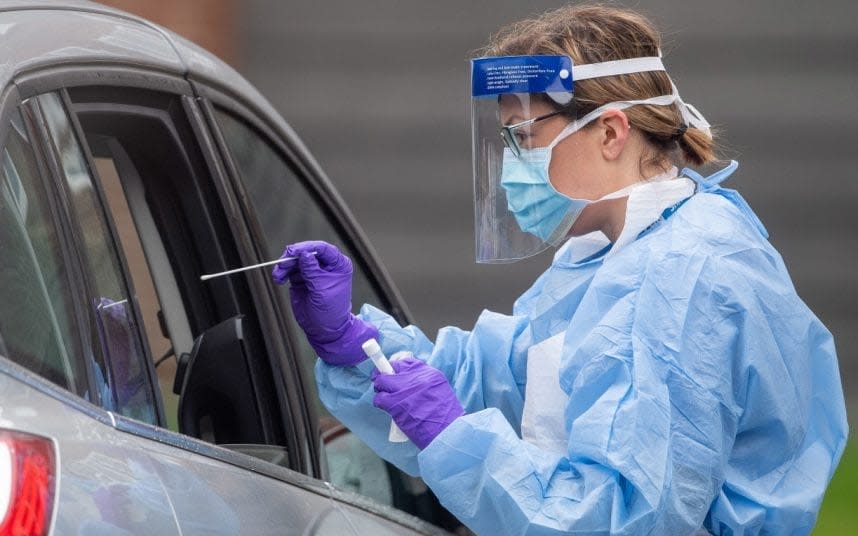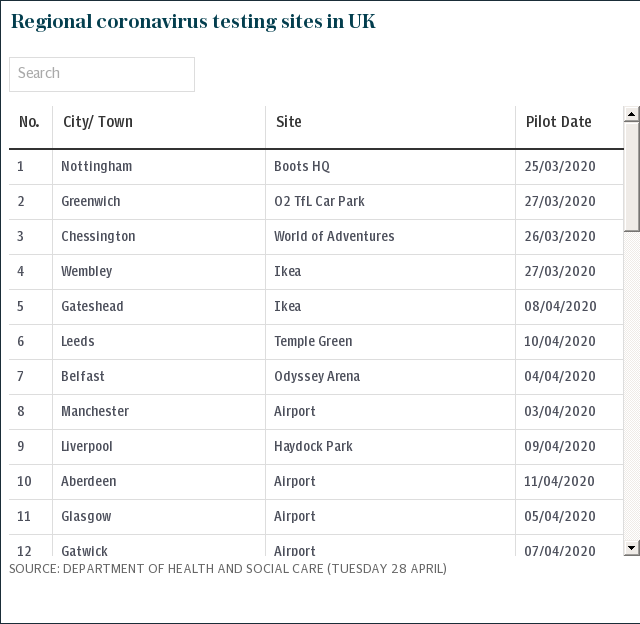Where can I get a coronavirus test near me?


While lockdown may still be in full swing, there are small signs emerging that the UK could be preparing to get back to normal again. In recent weeks, Nicola Sturgeon has spoken about choosing a 'bubble' of ten friends to socialise with, while increased levels of traffic have been spotted on roads around Britain.
One pathway out of the lockdown is through increased testing for Covid-19. Speaking at a press briefing in April, Dominic Raab laid out five tests that must be met if the government is to lift social distancing measures. One of these was confidence that supplies of testing and PPE are able to meet demand.
Coronavirus testing became available for millions more people in England after the government loosened rules on who can apply.
Speaking at a coronavirus briefing, Health Secretary Matt Hancock said: "From construction workers to emergency plumbers, from research scientists to those in manufacturing, the expansion of access to testing will protect the most vulnerable and help keep people safe."
Mr Hancock later announced on Friday 1 May that the Government met its target to conduct at least 100,000 coronavirus tests a day, hailing an “incredible achievement”.
The Health Secretary said 122,347 tests for Covid-19 were achieved on the final day of April, the self-imposed deadline he seemed likely to miss even earlier in the week.
There has also been increased interest in the development of an antibody test, which are supposed to be able to detect whether a person has already had the coronavirus before, and has since recovered.
But who is eligible for testing and where can you get one? We’ve answered these questions and more below…
Who is eligible for a coronavirus test?
Key workers including NHS doctors, nurses, healthcare staff, transport workers, shopkeepers, teachers, and those who work in key public services, such as postal workers and journalists, are all eligible to be tested.
Hospital patients suspected of having coronavirus can be tested, too.
As of this week, this eligibility has been expanded to include care home residents and staff, regardless of whether they have symptoms, and people over the age of 65 who must leave home to work. Those they live with will also be able to get tested under the new government guidelines.
This expansion comes after a rise in care home deaths across the country. According to the Office for National Statistics, a third of all coronavirus deaths in England and Wales are now happening in care homes.
To apply for a test, you can visit the government website here.
Where are the coronavirus testing centres?
According to the Department of Health and Social Care, there are 43 regional testing centres available to the public as of the 28 April - 15 of which have opened in the last week.
The first ones of these were located in out-of-town sites, such as the IKEA car park in Wembley and Chessington theme park near the M25. However, their location was criticised by NHS staff who said they were located too far from the capital.
The Government is also planning for 11 mobile testing centres - based at Nottingham, Wembley, Gateshead, Leeds, Manchester, Gatwick, Plymouth, Edgbaston, Stansted Airport, Preston and Bristol - to provide further cover, along with home-testing kits.
Telegraph analysis revealed that more than a million people in the UK live over an hour from their nearest coronavirus testing centre.
The worst areas for connectivity are Cornwall and Norwich, which are more than an hour's drive from a test centre.
You can find your nearest coronavirus test centre on the list below:

How do I apply for a test?
You can apply for a test at one of these regional centres by submitting an application through the government website.
Following your application, you will receive an email or a text the same day inviting you to book a test at your local drive through site.
If you are unable to access one of these centres, you can order a test to your home, complete with swabs and instructions.
However, there are still teething problems due to the high demand for tests. The home tests have been booked out within minutes of becoming available online while drive-through test centres have experienced long queues.
Can I get a private test?
While the health secretary Matt Hancock has promised to ramp up testing to 100,000 a day, many people are seeking alternatives after becoming frustrated with delays.
Private testing kits are an option for those who want to be tested quickly, and don't mind paying. They can be ordered online, via a number of private clinics and laboratories.
Summerfield Healthcare is offering one of the cheapest tests, with prices ranging from £199 to £299. The Private Harley Street Clinic is selling a home testing kit for £395 which also covers nine other respiratory viruses, including flu.
Results are promised within days of receipt of an individual’s samples, though in some cases customers are being advised that due to “a high volume of requests” there may be longer waits.

How does the test work?
The actual process of being tested for coronavirus is fairly straightforward. It involves getting a sample by pushing a swab deep inside the nose or to the back of the throat.
All those tested under the NHS scheme will get their results by text within 48 hours of having their swab taken.
What is an antibody test?
Unlike a conventional coronavirus swab, an antibody test looks to see whether your immune system has responded to the infection. It takes around 15 minutes to determine a result.
The test is carried out by a device that pricks your finger for blood. It works by testing your blood for the antibodies to see if they have already beaten the virus and gained some immunity to it.
The Government had been hoping to roll out millions of antibody tests in the coming weeks, but supplies from China have so far failed to pass sensitivity and specificity tests.

